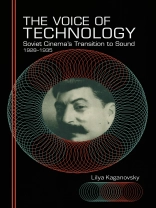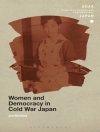As cinema industries around the globe adjusted to the introduction of synch-sound technology, the Soviet Union was also shifting culturally, politically, and ideologically from the heterogeneous film industry of the 1920s to the centralized industry of the 1930s, and from the avant-garde to Socialist Realism. In The Voice of Technology: Soviet Cinema’s Transition to Sound, 1928–1935, Lilya Kaganovsky explores the history, practice, technology, ideology, aesthetics, and politics of the transition to sound within the context of larger issues in Soviet media history. Industrialization and centralization of the cinema industry greatly altered the way movies in the Soviet Union were made, while the introduction of sound radically altered the way these movies were received. Kaganovsky argues that the coming of sound changed the Soviet cinema industry by making audible, for the first time, the voice of State power, directly addressing the Soviet viewer. By exploring numerous examples of films from this transitional period, Kaganovsky demonstrates the importance of the new technology of sound in producing and imposing the 'Soviet Voice.’
Spis treści
Acknowledgments
Note on Transliteration
Prologue
Introduction: The Long Transition: Soviet Cinema and the Coming of Sound
1. The Voice of Technology and the End of Soviet Silent Film: Grigori Kozintsev and Leonid Trauberg’s Alone
2. The Materiality of Sound: Dziga Vertov’s Enthusiasm and Esfir Shub’s K.Sh.E.
3. The Homogeneous Thinking Subject, or Soviet Cinema Learns to Sing: Igor Savchenko’s The Accordion
4. Multilingualism and Heteroglossia in Aleksandr Dovzhenko’s Ivan and Aerograd
5. 'Les Silences de la voix’: Dziga Vertov’s Three Songs of Lenin
Conclusion: Socialist Realist Sound
Works Cited
Index
O autorze
Lilya Kaganovsky is Associate Professor of Slavic, Comparative Literature, and Media & Cinema Studies at the University of Illinois, Urbana-Champaign. She is author of How the Soviet Man was Unmade, and editor (with Lauren M. E. Goodlad and Robert A Rushing) of Mad Men, Mad World: Sex, Politics, Style and the 1960 and (with Masha Salzkina) of Sound, Music, Speech in Soviet and Post-Soviet Cinema (IUP).












